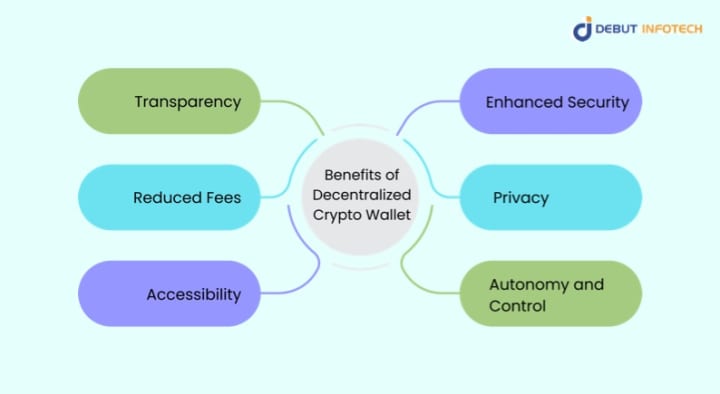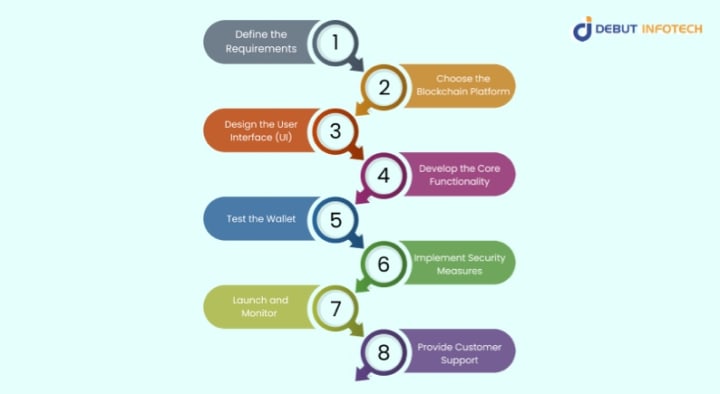Decentralized Crypto Wallets: Revolutionizing Digital Asset Management
Decentralized Crypto Wallets

In the rapidly evolving world of blockchain and cryptocurrencies, secure and private transactions are paramount. A crucial component in this ecosystem is the crypto wallet, specifically decentralized cryptocurrency wallet, which empower users with full control over their digital assets. Unlike centralized wallets, decentralized wallets offer enhanced security, privacy, and autonomy, aligning with the core principles of blockchain technology. This article delves into the intricacies of decentralized crypto wallets, their functioning, benefits, and the steps involved in building one.
What is a Decentralized Wallet?
A decentralized wallet is a type of digital wallet that allows users to store, manage, and transact their cryptocurrencies without relying on a central authority or intermediary. Unlike centralized wallets, which are managed by third-party entities like exchanges or financial institutions, decentralized wallets operate directly on the blockchain, ensuring that users have full control over their private keys and funds. This autonomy ensures higher security and privacy, as users are not dependent on external entities that could potentially be compromised.
Decentralized wallets are integral to the ethos of cryptocurrencies, which emphasize decentralization, security, and user control. By eliminating intermediaries, these wallets reduce the risks associated with centralized points of failure and enhance the transparency and integrity of transactions.
Related Read: The Ultimate Guide to Decentralized Cryptocurrency Wallets
How Does a Decentralized Crypto Wallet Work?
Decentralized crypto wallets function through a combination of cryptographic principles and blockchain technology. Here’s a breakdown of their operational mechanism:
1. Private and Public Keys
At the core of any decentralized wallet are private and public keys. The private key is a secure, unique string of characters known only to the user, while the public key is derived from the private key and can be shared openly. The private key allows users to sign transactions, proving ownership and enabling the transfer of funds. The public key is used to receive funds.
2. Wallet Address
The public key is hashed to generate a wallet address, which acts as a user’s unique identifier on the blockchain. This address can be shared with others to receive payments.
3. Blockchain Interaction
When a transaction is initiated, the wallet uses the private key to sign it, ensuring that the transaction is authorized by the owner of the funds. This signed transaction is then broadcast to the blockchain network, where it is validated by nodes (miners or validators) and added to the blockchain ledger.
4. Security Measures
Decentralized wallets often incorporate additional security features such as seed phrases, two-factor authentication (2FA), and biometric verification to enhance security. A seed phrase is a series of words that can be used to recover the wallet if the private key is lost.
5. Non-Custodial Nature
In decentralized wallets, users are solely responsible for their private keys. This non-custodial nature means that even if the wallet provider's service is disrupted, users can still access their funds using their private keys.
Benefits of Decentralized Crypto Wallet

Decentralized crypto wallets offer several advantages that make them appealing to cryptocurrency enthusiasts:
1. Enhanced Security
By eliminating intermediaries, decentralized wallets reduce the risk of hacks and unauthorized access. Users retain control over their private keys, minimizing the risk of centralized data breaches.
2. Privacy
Decentralized wallets offer greater privacy, as transactions are conducted directly on the blockchain without the need for KYC (Know Your Customer) procedures imposed by centralized entities.
3. Autonomy and Control
Users have full control over their funds and transactions. This autonomy aligns with the decentralized philosophy of blockchain technology, ensuring that users are not dependent on third-party services.
4. Transparency
Transactions conducted through decentralized wallets are recorded on the blockchain, providing a transparent and immutable ledger. This transparency enhances trust and accountability.
5. Reduced Fees
Decentralized wallets often have lower transaction fees compared to centralized exchanges, as there are no intermediaries involved.
6. Accessibility
These wallets are accessible to anyone with an internet connection, enabling financial inclusion and participation in the global cryptocurrency ecosystem.
Types of Crypto Wallets
Cryptocurrency wallets can be broadly categorized into several types based on their functionality and security features:
1. Hot Wallets
Hot wallets are connected to the internet, making them easily accessible for transactions. They are convenient for day-to-day use but are more susceptible to online threats. Examples include mobile wallets, desktop wallets, and web wallets.
2. Cold Wallets
Cold wallets are offline wallets that provide enhanced security by keeping the private keys offline. They are ideal for long-term storage of cryptocurrencies. Examples include hardware wallets and paper wallets.
3. Hardware Wallets
These are physical devices that store private keys offline. They offer robust security and are resistant to malware and hacking attempts. Popular hardware wallets include Ledger Nano S and Trezor.
4. Software Wallets
Software wallets are applications or programs that can be installed on a computer or mobile device. They offer a balance between security and convenience. Examples include Exodus and Electrum.
5. Paper Wallets
A paper wallet involves printing the private and public keys on a piece of paper. This method provides high security by keeping the keys offline, but it requires careful handling to avoid loss or damage.
6. Web Wallets
These wallets are accessed through web browsers and are managed by third-party service providers. They are convenient but come with security risks associated with centralized control.
Step-by-Step Guide on Building a Decentralized Crypto Wallet

Building a decentralized crypto wallet involves several technical and strategic steps. How is a comprehensive guide on how to create a crypto wallet:
1. Define the Requirements
Determine the purpose and scope of the wallet. Consider factors such as supported cryptocurrencies, target user base, security features, and platform compatibility (mobile, web, or desktop).
2. Choose the Blockchain Platform
Select a blockchain platform that aligns with your wallet’s requirements. Popular choices include Ethereum, Bitcoin, Binance Smart Chain, and Solana. Each platform has its own protocols, standards, and developer tools.
3. Design the User Interface (UI)
Create an intuitive and user-friendly interface. Focus on ease of use, accessibility, and seamless navigation. Ensure that the design accommodates essential features like transaction history, balance display, and security settings.
4. Develop the Core Functionality
Implement the core features of the wallet, including:
a) Key Generation
Develop a secure method for generating and storing private and public keys.
b) Transaction Management
Enable users to send, receive, and manage their cryptocurrency transactions.
c) Security Protocols
Incorporate encryption, seed phrases, and authentication mechanisms to enhance security.
d) Blockchain Integration
Establish connectivity with the chosen blockchain platform to facilitate transactions and updates.
5. Test the Wallet
Conduct rigorous testing to identify and rectify any bugs or vulnerabilities. Perform both functional and security testing to ensure the wallet operates smoothly and securely.
6. Implement Security Measures
Integrate advanced security features such as:
a) Two-Factor Authentication (2FA)
Enhance security by requiring an additional verification step.
b) Biometric Authentication
Use fingerprint or facial recognition for added security.
c) Regular Updates
Ensure the wallet software is regularly updated to address emerging threats and vulnerabilities.
7. Launch and Monitor
Once the wallet is fully developed and tested, launch it to the target audience. Continuously monitor its performance, gather user feedback, and implement improvements to enhance user experience and security.
8. Provide Customer Support
Offer robust customer support to assist users with any issues or queries. Provide comprehensive documentation and resources to help users navigate and utilize the wallet effectively.
Factors to Consider When Selecting the Right Decentralized Crypto Wallet Development Company
Choosing the right decentralized cryptocurrency wallet development services is crucial for ensuring the security, functionality, and scalability of your wallet. A well-developed wallet can provide a seamless user experience while safeguarding digital assets.
Here are the key factors to consider when selecting a company for your decentralized crypto wallet development needs:
1. Expertise and Experience
The foremost factor to consider is the company's expertise and experience in developing decentralized crypto wallets, including custodial vs non custodial wallet. A company with a proven track record and extensive experience in blockchain technology will likely deliver a robust and secure product. Review their portfolio to see past projects and assess their ability to meet your requirements.
2. Security Protocols
Security is paramount in crypto wallet development. The wallet and DeFi development company should employ state-of-the-art security measures to protect against potential threats such as hacking, phishing, and unauthorized access. Look for features like multi-signature support, two-factor authentication, and end-to-end encryption. Verify that the company adheres to industry standards and continuously updates its security protocols.
3. Customization and Flexibility
Every business has unique needs, and the ability to customize the wallet to suit specific requirements is essential. The development company should offer flexible solutions that can be tailored to your business model, whether you need specific functionalities, user interfaces, or integration with other services. This ensures that the final product aligns perfectly with your operational goals.
4. Technology Stack
The technology stack used by the development company significantly impacts the wallet's performance, scalability, and security. Ensure that the company utilizes the latest and most reliable technologies in blockchain and cryptocurrency. Technologies such as Solidity for smart contract development, React Native for mobile applications, and robust back-end solutions are critical for building best decentralized crypto wallets.
5. User Experience (UX) and User Interface (UI) Design
A seamless and intuitive user experience is vital for the widespread adoption of your crypto wallet and centralized crypto exchanges. The development company should prioritize UX/UI design, ensuring that the wallet is easy to use, visually appealing, and accessible across different devices. A well-designed interface enhances user engagement and satisfaction, leading to higher retention rates.
6. Compliance and Regulatory Knowledge
Navigating the regulatory landscape in the cryptocurrency industry can be complex. The development company should have a thorough understanding of the relevant regulations and compliance requirements in different jurisdictions. This ensures that your wallet adheres to legal standards, reducing the risk of regulatory issues in the future.
7. Support and Maintenance
Post-development support and maintenance are crucial for the long-term success of your crypto wallet. The company should offer comprehensive support services, including regular updates, bug fixes, and enhancements. A reliable support system ensures that any issues are promptly addressed, maintaining the wallet's performance and security over time.
8. Cost and Time Efficiency
While cost should not be the sole deciding factor, it is essential to consider the pricing structure and overall cost-effectiveness of the development services. Compare quotes from different companies and evaluate what is included in the price. Additionally, consider the development timeline and ensure that the company can deliver the project within your desired time frame without compromising on quality.
9. Client Reviews and Testimonials
Client reviews and testimonials provide valuable insights into the company's reputation and reliability. Look for feedback from previous clients to gauge their satisfaction with the services provided. Positive reviews and high ratings are indicators of a trustworthy and competent development partner.
10. Intellectual Property Rights
Clarify the ownership of intellectual property (IP) rights before commencing the project. Ensure that the development company will transfer all IP rights to you upon project completion. This guarantees that you have full control and ownership over the wallet, allowing you to modify or enhance it as needed in the future.
11. Transparent Communication
Effective communication is key to a successful development project. The company should maintain transparent and open communication throughout the development process, providing regular updates and being responsive to your queries and concerns. This ensures that you are always informed about the project's progress and can provide input when necessary.
12. Scalability and Future-Proofing
The cryptocurrency market is dynamic and constantly evolving. Your crypto wallet should be scalable and adaptable to future technological advancements and market trends. The development company should design the wallet with scalability in mind, allowing for easy upgrades and expansions as your business grows.
13. Innovative Approach
Innovation is crucial in the rapidly evolving field of cryptocurrency. The development company should have a forward-thinking approach, staying abreast of the latest trends and technologies. This ensures that your wallet is equipped with cutting-edge features and remains competitive in the market.
Conclusion
Decentralized crypto wallets are a cornerstone of the cryptocurrency ecosystem, offering enhanced security, privacy, and control to users. By understanding their functionality, benefits, and the steps involved in building one, developers and users alike can appreciate the value they bring to the decentralized financial landscape.
Selecting the right decentralized crypto wallet development company is a critical decision that impacts the success of your digital wallet. By considering factors such as expertise, security protocols, customization options, technology stack, UX/UI design, compliance, support, cost-efficiency, client reviews, IP rights, communication, scalability, and innovation, you can make an informed choice.
Debut Infotech stands as a premier decentralized crypto wallet development company, combining cutting-edge technology with unparalleled expertise. Specializing in secure, user-friendly, and scalable wallet solutions, we cater to the evolving needs of the cryptocurrency landscape. Our team of seasoned developers ensures robust security protocols, safeguarding your digital assets against potential threats.
Choosing Debut Infotech means leveraging our extensive experience and commitment to excellence. We offer bespoke wallet solutions tailored to your specific requirements, ensuring seamless integration and optimal performance. Our dedication to transparency, innovation, and client satisfaction positions us as a trusted partner in your digital journey.
About the Creator
White Label Crypto Wallet
Our customizable white label crypto wallet solution empowers users with seamless and secure cryptocurrency management. Debut Infotech offers a tailored crypto wallet experience that aligns perfectly with your brand identity.
Enjoyed the story? Support the Creator.
Subscribe for free to receive all their stories in your feed.






Comments
There are no comments for this story
Be the first to respond and start the conversation.